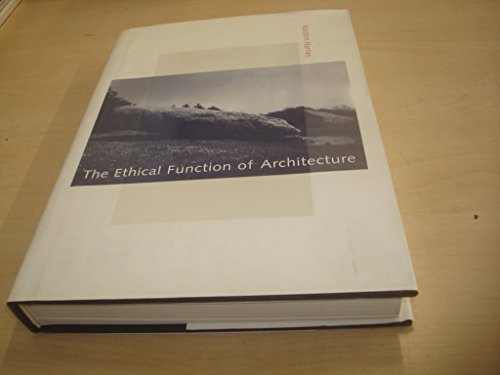Verwandte Artikel zu The Ethical Function of Architecture

Inhaltsangabe
Can architecture help us find our place and way in today's complex world? Can it return individuals to a whole, to a world, to a community? Developing Giedion's claim that contemporary architecture's main task is to interpret a way of life valid for our time, philosopher Karsten Harries answers that architecture should serve a common ethos. But if architecture is to meet that task, it first has to free itself from the dominant formalist approach, and get beyond the notion that its purpose is to produce endless variations of the decorated shed. In a series of arguments, Harries questions the premises on which architects and theorists have long relied - premises which have contributed to architecture's current identity crisis and marginalization. He first criticizes the aesthetic approach, focusing on the problems of decoration and ornament. He then turns to the language of architecture. If the main task of architecture is indeed interpretation, in just what sense can it be said to speak, and what should it be speaking about? Expanding upon suggestions made by Martin Heidegger, Harries also considers the relationship of building to the idea and meaning of dwelling. Architecture, Harries observes, has a responsibility to community; but its ethical function is inevitably also political. He concludes by examining these seemingly paradoxical functions.
Die Inhaltsangabe kann sich auf eine andere Ausgabe dieses Titels beziehen.
Críticas
" The stirring gift of a mind like Karsten Harries allows a link between architecture and philosophy. In our splintered, individualist age he reminds us it is impossible to think without generalities." -- Steven Holl, Architect & quot; The stirring gift of a mind like Karsten Harries allows a link between architecture and philosophy. In our splintered, individualist age he reminds us it is impossible to think without generalities.& quot; -- Steven Holl, Architect "The stirring gift of a mind like Karsten Harries allows a link between architecture and philosophy. In our splintered, individualist age he reminds us it is impossible to think without generalities."--Steven Holl, Architect
Reseña del editor
Can architecture help us find our place and way in today's complex world? Can it return individuals to a whole, to a world, to a community? Developing Giedion's claim that contemporary architecture's main task is to interpret a way of life valid for our time, philosopher Karsten Harries answers that architecture should serve a common ethos. But if architecture is to meet that task, it first has to free itself from the dominant formalist approach, and get beyond the notion that its purpose is to produce endless variations of the decorated shed. In a series of arguments, Harries questions the premises on which architects and theorists have long relied - premises which have contributed to architecture's current identity crisis and marginalization. He first criticizes the aesthetic approach, focusing on the problems of decoration and ornament. He then turns to the language of architecture. If the main task of architecture is indeed interpretation, in just what sense can it be said to speak, and what should it be speaking about? Expanding upon suggestions made by Martin Heidegger, Harries also considers the relationship of building to the idea and meaning of dwelling. Architecture, Harries observes, has a responsibility to community; but its ethical function is inevitably also political. He concludes by examining these seemingly paradoxical functions.
„Über diesen Titel“ kann sich auf eine andere Ausgabe dieses Titels beziehen.
EUR 4,26 für den Versand innerhalb von/der USA
Versandziele, Kosten & DauerSuchergebnisse für The Ethical Function of Architecture
The Ethical Function of Architecture Karsten Harries
Anbieter: Big Star Books, Santa Fe, NM, USA
hardcover. Zustand: Very Good. Hardcover, in jacket. Clean, unmarked, tightly bound. Light wear. Photos available. We ship daily. Expedited shipping available! (Heavy books & sets may require extra shipping charges.). Artikel-Nr. AVA3235
Anzahl: 1 verfügbar
The Ethical Function of Architecture Karsten Harries,
Anbieter: Antiquariat Maiwald, Langen, HES, Deutschland
Gebundene Ausgabe. Zustand: Gut. 403 Seiten, Schutzumschlag mit Lagerspuren und leicht fleckig, Kopfschnitt leicht stockfleckig, in gutem Zustand, AW-729 9780262082525 Sprache: Englisch Gewicht in Gramm: 1300. Artikel-Nr. 74397
Anzahl: 1 verfügbar

